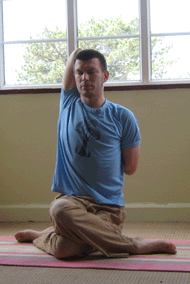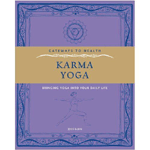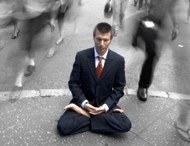 |
||
Beat Menopause Weight Gain Interview Joss Guin, The Yoga TreePractising yoga during menopause can have many so benefits, building strength, flexibility and helping to calm that ever-racing midlife mind. Yoga practitioner and author Joss Guin of The Yoga Tree is here to tell us how yoga can both soothe our minds and strengthen our bodies, as we battle our way through the demands of midlife. Joss runs classes in Norfolk (UK) and is author of a beautiful little book, Gateways to Health: Karma Yoga . So, let's find out how yoga can make a difference in your life - and the good news is, you don't have to be super-bendy to try it! Hi Joss, thanks for taking the time to talk to us. First of all, can you tell us how you first discovered yoga, and what difference it has made to your life? I started practising Hatha Yoga, the type of yoga that teaches posture and breath control, when I was a young teenager to help me overcome a knee problem I'd developed from excessive Martial Arts training. What I found, was a complete system of physical and mental self-improvement, like a combination between preventative physiotherapy and psychotherapy. Eighteen years later, yoga has helped me attain a excellent level of health, a strong mind, a good attitude for meeting life, and enhanced my self-awareness. Lots of women explore yoga as they grow older. What do you think are the greatest mental and physical benefits that yoga has to offer to women in midlife? As a yoga teacher, I've seen yoga help many women achieve their goal weight in a healthy way. During The Yoga Tree classes and private lessons I teach a range of postures that help women before during and after menopause. Yoga can help to balance hormone production which can make menopause easier. Simply by practising yoga for a little while you'll become more self-aware and more sensitive to the way menopause affects your body which in turn makes you more mentally able to deal with the changes in your body. During and after menopause, yoga can help you maintain optimum health. For instance, poses where you bear your whole body weight through one leg or your arms help the body lay down calcium and prevent osteoporosis. Bending and twisting postures help prevent fat deposits from settling, and inversions help balance appetite and metabolism changes which can also help with weight gain. Holding your body in the yoga postures builds strength, especially of core muscles and muscles that support joints. How much yoga should people try to fit into their daily lives to get the most benefit?  Yoga is designed to be practised a little each day. The best way is to include it into a daily routine the way we do with brushing teeth and washing. In my book Gateways to Health: Karma Yoga I offer 5 combinations of postures, and 5 breathing and meditation exercises which are easy to fit into even a busy schedule. I like yoga to be a spontaneous experience, where you practice once a week to start with, find something useful and start to include it in your routine each day. Over time maybe you add a few more exercises so that almost without noticing you may find 2 or 3 years down the line that you spend 20 minutes a day or so doing the yoga exercises that help you best. People often think you have to be super-bendy to try yoga. How fit and supple does someone need to be in order to give it a try? I'm always amused by the idea that someone has to be bendy to practice yoga! It's like saying you need to be well-educated to go to school. Generally however I would rather yoga was associated with self-awareness, rather than super-flexibility. I have always been flexible so my challenge with yoga has been to gain core strength and co-ordination. Other students start with the strength and develop mobility over time. Often the way yoga helps most is to balance habitual ways of moving and holding your body which cause damage or steal your energy day in and day out. Is there anything else you'd like to mention about yoga Joss, and how it can enhance and improve people's lives, especially at midlife?  Traditionally in India life is informally split into four parts, youth and education, adulthood with work and social duty, midlife with a slowing down and introspection, and retirement with an emphasis on spirtual practice free from social or family obligations. I think that this can be just as helpful in modern times. A period of transition is always a good time to take stock of where you are, who's changing, what's different, and to ask yourself: Where am I going? This kind of introspection can be very helpful in intelligently meeting the challenges and opportunities of such an important stage of life. A huge Thank You to Joss Guin for allowing us to learn more about the benefits of yoga during menopause and telling us about The Yoga Tree and his book, Gateways to Health: Karma Yoga - recommended reading. Go from Interview with Joss Guin to Beat Menopause Weight Gain Interviews. Go from Interview with Joss Guin to Beat Menopause Weight Gain. |
OUR FREE REPORT!
Get the Healthy Eating Habit and Lose Weight For Ever 
We hate spam and will never give away or sell your email address Yoga and StressThinking of trying yoga? Not only is it good for your physical health, it can really help to relieve the symptoms of stress. |
|
|
|
||
FEEL GOOD IN YOUR BODY!Beat-menopause-weight-gain.com does not offer medical advice. Please consult your physician before making any changes to your usual lifestyle.View our Terms of Use and Privacy Policy |
||
|
Beat Menopause Weight Gain - Feel Good in Your Body! - All Rights Reserved - Copyright© 2008-2012
| ||


